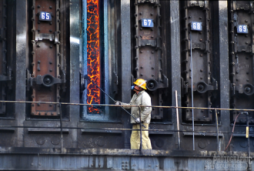- 0086(21)62671680
- 62671061
- sales@hyssgroup.com
- Language

Shanghai re-bar steel futures climbed to their strongest in more than five years on Tuesday and were headed for their best month in eight as output curbs in China aimed at fighting pollution tightened supply in the world’s top consumer and producer.
The city of Changzhou in Jiangsu, China’s No. 2 steelmaking province, has issued a draft plan ordering steel mills as well as copper smelters, chemical makers and cement producers to shut down or cut production by as much as 50 percent by Aug. 3 at the latest.
It’s the latest city to impose restrictions for environmental reasons, with Tangshan cutting emissions for six weeks during summer, while most industrial plants in Xuzhou remain shut.
The most actively traded rebar for October delivery on the Shanghai Futures Exchange rose as far as 4,178 yuan ($612) a tonne, its loftiest since February 2013, and was up 0.9 percent at 4,161 yuan by 0209 GMT.
The construction steel product has risen 10 percent so far this month, the most since November.
Average daily steel output by members of industry group China Iron and Steel Association stood at 1.96 million tonnes on July 11-20, down 19,200 tonnes from the first 10 days of July, the group said on its website.
“Steel production is further impacted by environmental protection and total steel inventory at traders and mills is at a five-year low,” Morgan Stanley analysts said in a note.
Stockpiles of rebar at Chinese traders fell to the lowest since January at 4.09 million tonnes last week, data compiled by consultancy SteelHome showed.
The price of iron ore slipped as the steel production curbs threatened to limit appetite for the steelmaking raw material.
Most-traded September iron ore on the Dalian Commodity Exchange was off 0.2 percent at 487 yuan per tonne. The contract has risen 3.2 percent so far in July, lagging gains in rebar.
But China’s pollution battle has kept demand for high-grade iron ore strong, as evidenced by rising prices for high-quality iron ore pellets.
The price of 65-percent grade pellet climbed to $133.05 a tonne on July 27, the highest since May 2014, according to Metal Bulletin.
Its premium over the medium grade 62-percent ore stood at nearly $66, close to a record $67.76 reached on July 20.
“Elevated steel mill margins provide the ability to pay for high-grade ore,” Commonwealth Bank of Australia analyst Vivek Dhar wrote in a report.
“That highlights just how influential China’s steel reform policy has been in removing outdated capacity, thereby improving capacity utilization rates and supporting steel prices.”
Source: reuters.com